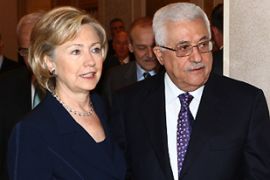US criticised over stand on Israel
Palestinians accuse US of jeopardising peace process after backing Israel on settlements.

Mahmoud Abbas, the Palestinian president and leader of the secular Fatah party, is under pressure at home before elections due at the beginning of 2010.
Question of precondition
Abbas met Benyamin Netanyahu, the Israeli prime minister, in the US in September, despite previously refusing to such an encounter unless Israel agreed a settlement halt.
His move was seen as a climbdown, particularly among supporters of the Fatah’s rival Islamist faction Hamas, which governs the Gaza Strip.
Hillary Clinton, the US secretary of state, said at a news conference in Jerusalem late on Saturday that the settlement issue should now be considered as part of peace negotiations only.
| in depth | |||||||||||||
|
“There has never been a precondition. It’s always been an issue within the negotiations,” she said.
The US administration had previously demanded that Israel halt all settlement building before negotiations could resume, a move that was applauded by the Palestinians but which brought the US and Israel to loggerheads.
Jacky Rowland, Al Jazeera’s Jerusalem correspondent, said: “The Americans would never admit to backtracking, but if we watch the way that the language has changed and the way the emphasis has changed, it’s quite clear there has been a slide in the American position.
“Now, we hear Hillary Clinton urging an immediate resumption of talks – ‘get back on the path’, she said, really not wanting to look at conditions.”
Ghassan Khatib, a Palestinian Authority spokesman, told Al Jazeera: “Frankly speaking, I did not expect this shift to happen.
“Now the question is ‘What needs to be done?’. The Palestinians will have great difficulties allowing the resumption of negotiations alongside the continuing of settlement expansion.
“Especially [given] that Israel has increased its provocative activities through settlers whether in the West Bank … or in occupied East Jerusalem, through restricting the right of Palestinian Muslims for worshipping, in addition to restricting the rights of all Palestinians in East Jerusalem and the eviction process that has increased recently.”
Shifting position
In May, Clinton had said Barack Obama, the US president, “wants to see a stop to settlements. Not some settlements, not outposts, not natural growth exceptions”.
But after bringing Abbas and Netanyahu together at the United Nations in New York in September, Obama called only for “restraint” on settlements, not a “freeze”.
Mouin Rabbani, a contributing editor to The Middle East Report, said that it was not surprising that the US had changed its stance.
“In January [and] February this year there were all kinds of hoorays on the basis that the Obama administration was somehow going to effect a revolution in American foreign policy,” he told Al Jazeera from Amman, the Jordanian capital.
 |
| The US had initially demanded a halt to any construction in the occupied territories [AFP] |
“If you look at what’s happened over the course of the past year, it’s basically been a gradual collapse of the American position, which in my view [means] there is] absolutely no surprise that they’ve ended up where they are now – basically heeding Israel’s decision to continue settlement constructon in the occupied territories.”
Rabbani said a “pattern is consistent with American policy since the beginning of Israel-Palestine diplomacy in the early 1990s – always leaning on the Palestinians to make concessions in order to solve the problems they’re having with the Israelis. No surprise here; nothing new.”
Akiva Eldar, the chief political commentator of Israel’s Haaretz daily, described the move as a “betrayal”
“The secretary of state, I assume with the full support of the president, has turned around after 10 months of negotiating the precondition of freezing settlements … she says there is no precedent to preconditions,” he told Al Jazeera.
“The fact that there was no precedent actually demonstrates why there are now 300,000 settlers living in the West Bank and just 16 years ago when the Oslo Agreement was launched there were 109,000 settlers.
“The message from Obama was change. Not about keeping the same kind of American policy that turns a blind eye to Israel putting facts on the ground.”
Palestinian stand
Abbas earlier rejected Clinton’s request to resume negotiations when they met in Abu Dhabi in the United Arab Emirates.
Erekat, the Palestinian negotiator, said Abbas rejected the US request because the recent deal reached between George Mitchell, the US Middle East envoy, and Israel “does not include a complete freeze of settlement activities”.
|
“The real problem is that Israel is not ready to discuss these issues and America is still unable to convince the Israelis to come back to the ‘road map'” Nabil Abu Rudeineh, |
Erekat said that Israel had refused to halt construction of about 3,000 houses currently being built in the West Bank or any construction in annexed East Jerusalem.
Abu Rudeineh, the Abbas spokesman, said the move reflected US inability to persuade Israel to freeze settlement building, but that Clinton had told the Palestinians that the US still considered the settlements illegal.
“The US position concerning these settlements – as we heard from Clinton in the UAE – was clear, that they consider all settlement activities illegal and this is an official US position which we heard many times before,” he told Al Jazeera.
“The real problem is that Israel is not ready to discuss these issues and America is still unable to convince the Israelis to come back to the ‘road map’,” Abu Rudeina said, referring to a plan for steps to be taken by Israel and the Palestinians, first outlined in 2002.
“Even the previous American administration [under George Bush] in Annapolis agreed that settlement activity should be frozen.”
